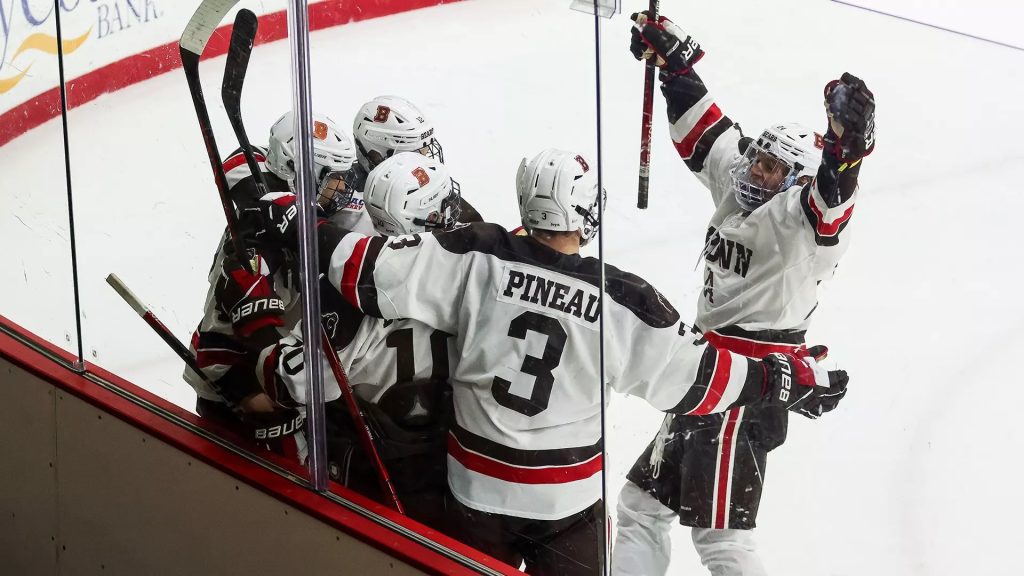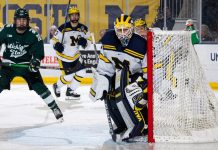
Brown coach Brendan Whittet understood the importance of what he saw at the start of the 2023-2024 season.
His Bears were trending younger after turning over their roster, and virtually everyone predicted a last-place finish for a team reliant on newcomers in all three phases. Nearly every metric pointed towards a reboot after the team came within a precious few games of hosting last year’s first round, but any step backwards from a top-heavy team built on its defense and goaltending meant a sustained growth period in a highly competitive conference.
Based on pure numbers, someone had to finish in last place, and the preseason prognostications saw Brown as the logical fit for that role.
Whittet was never one for those predictions to begin with, but it’s safe to say that he saw something significantly different from Brown’s first half. His team was still young and growing, but their competitive results revealed something greater about a roster close to turning a few heads. Production trended towards a top-heavy statistical output, but the ability to take points in games that featured the growth was immeasurable to a league that immediately looked more even than most seasons.
The Bears simply got closer and closer, and after nearly sweeping their trip to the Capital District two weeks ago, a six-point weekend over Ivy League rivals rocketed a resilient group into second place with an opportunity that’s been decades in the making in Providence.
“We have a young team, and with a young team, you’re going to have some ups and downs,” said Whittet. “You’re going to have some really good growth moments and follow it with some incredibly frustrating moments, but what I’ve seen is a group that works incredibly hard. We’re getting better each and every time we step on the ice, and again, you’re going to have those ups and downs, but it’s about getting them to understand the tenacity and work and energy that goes into each time you try to win a hockey game while understanding that your opponent’s trying to do the same.”
ECAC operates under the perception of an unofficial glass ceiling, but Brown’s ascension into the league’s top tier is largely because the Bears kept committing to their core values and beliefs. Their reliance on toughness and team length promoted certain players to individual recognition, but this year’s team learned it together after last year’s roster lost some of its upper-class leadership.
New stalwarts emerged, and the increased time on ice presented Whittet’s crew with a ladder through the early season results. The overtime loss to Yale that preceded the regulation win over Colgate aside, Brown found itself learning how to make incremental steps in trials forged by fire. The Princeton game, for example, saw the Bears drop points after a 2-0 lead in the second period after the Tigers scored three straight, including the overtime winner, but the Clarkson loss one week later saw Brown earn a point when Ryan St. Louis tied a 2-1 game in the 17 seconds after the Golden Knights scored to take their first lead.
Those types of games taught valuable lessons before the second half of the year, and the Bears applied a signature toughness in beating Union in overtime last weekend. Forced to rally from a 2-1 deficit in the second period after the Garnet Chargers scored a short-handed goal, Brown instead found itself scoring the equalizer in the last 30 seconds of regulation before gaining a second point on Ryan Shostak’s overtime winner.
“Some of it’s a learned process,” Whittet said. “And where it’s learned for the players, it’s also a learned process for our coaching staff to figure out who works well with each other and what philosophically you want to do in those situations. In my mind, a three-on-three is a skills competition, so from our perspective, we had to work on some of that [with the players]. It would have been nice to learn some of those lessons without losing those three overtime games at the start of the year, but we’ve worked on it in terms of our possessions and who should be out there together.
“We’re much more comfortable in situational hockey than we were in the first half.”
Finding players who can score in those situations is a challenge for every hockey team, but Brown is starting to develop players who can add flair to a lineup that occasionally puts players on the ice for 25 or 30 minutes. Its top scorers include Ryan St. Louis, the son of noted Hockey Hall of Fame inductee Martin St. Louis and a sophomore transfer from Northeastern that’s currently one of five players in the league with double-digit goals, and Max Scott, a freshman who is ranked next to sophomore Ryan Bottrill as two players with at least 10 assists. Freshman Alex Pineau is a defenseman credited with the game-tying goal in the Union game, and a defenseman who scored the tying goal against Union, and Tyler Kopff and Ethan Mistry are both members of a freshman class currently atop the Bears’ scoresheet.
That’s a top six composed solely of first year or second year players, to which the seventh-leading scorer on the team is finally an older player in senior Jordan Tonelli.
“If you look at the minutes after each game, we tend to play certain guys,” Whittet said, “but these guys are also developing because we’re so young. Look at the Dartmouth game and Alex Pineau played close to 35 minutes. St. Louis had 24 minutes and isn’t part of our penalty kill. Kopff had 23 minutes and Bottrill played 18 minutes. Tony Andreozzi [a junior] played 30 minutes. Those are go-to guys, but those guys can play those minutes and play at a high level. They aren’t playing minutes just to play minutes because they’re dialed in on those minutes.
“There’s something to be said for developing trust in situations, and I’m of the conviction that you win and lose with your best players. Some of these guys can play big minutes, but they’ve also earned the opportunity to play those big minutes because they developed that trust through the early part of the season.”
It has Brown positioned to spend its last month battling for something that hasn’t been seen in Providence for a full generation. The last Bears team to host a quarterfinal round series as a top-four team was a 2003-2004 team that beat Vermont on the last day of the regular season to clinch the No. 3 seed. It memorably featured Hobey Hat Trick finalist Yann Danis in goal but resembled plenty of what Whittet, who was an assistant coach at Dartmouth during those days, is fomenting in his lineup.
The three top forwards – Brent Robinson, Brian Ihnacek and Les Haggett – all essentially reached the 30-point level by doing different things, and the rest of the team found roles suitable to every player. Vince Macri and Scott Ford were big, physical defensemen who knew how to pound opposing players at every end of the ice while scoring goals on the power play, and both Chris Swon, Nick Ringstad and Mike Meech offered depth scoring at the forward position.
Whittet became the program’s head coach five years after that team finished third, but while he’s been able to recreate the fabric of Brown at several different postseason junctures, the results in the regular season forced the Bears to play on the road in the second round. As ECAC opened its floodgates to this year’s season-long parity, it became apparent that one good weekend could work wonders for a team willing to play with the resilience woven into the team’s culture.
“That’s the beauty of the league this year,” Whittet said. “There’s a lot of teams that look exactly the same. One good weekend when you’re good and one good weekend when you’re not so good can take you into second and send you right back down. It’s that type of year, and it makes for a highly competitive finish. Every game has this incredible importance, but the way we look at it, every game is a playoff game. We’ve played half of our season, and we can’t be satisfied with second place in the league [in January].
“We need to work on ourselves and get better and better, so at the end of the year, we’re exactly where we need to be because it’s exciting, in that regard, to be in a league where it’s this wide open.”


